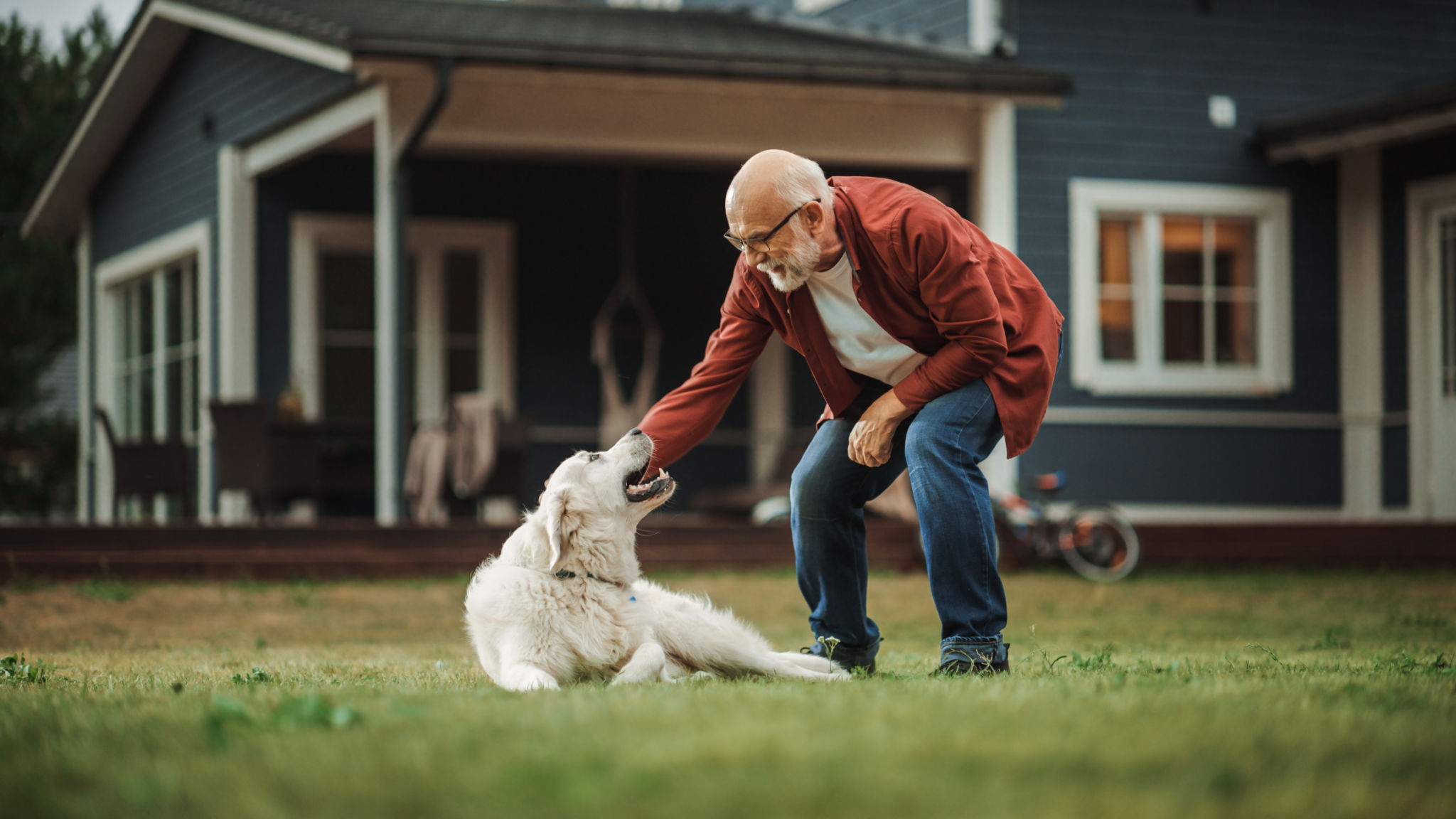Dog Training for Older Dogs: Effective Senior Techniques
DR
Effective Training Techniques for Senior Dogs
Train your older dog effectively with our expert techniques! Discover how dog training for older dogs can transform your senior pet into an obedient companion.

Senior dogs, typically classified as seven years or older, can face unique training challenges. They may have ingrained habits, sensory decline, or health issues that require special consideration. Understanding these factors is crucial for successful training. These dogs may also experience a decrease in energy levels, which can affect their responsiveness to traditional training methods. Moreover, their previous experiences and any past trauma might influence their behavior, necessitating a sensitive approach to training.
The simple answer is yes, you can train an older dog. Mature dogs are capable of learning and adapting, despite the common misconception that they cannot change old habits. With patience and consistency, you can teach your senior dog obedience and even some fun tricks. Older dogs often have a developed attention span compared to puppies, which can actually make training sessions more productive. They also tend to have a desire to please their owners, providing motivation for them to learn new commands and behaviors.
Each dog is unique, and a personalized training plan is essential. Consider your dog's health, personality, and previous training experiences. Tailoring your approach will make the process more enjoyable and effective for both you and your dog. For instance, if your senior dog has arthritis, avoid commands that require excessive physical activity. Instead, focus on mental exercises and low-impact activities. Additionally, understanding your dog's learning style—whether they respond better to verbal praise or treats—will help you customize your training methods for optimal results.
Positive reinforcement is the cornerstone of effective dog training, regardless of age. Rewarding your dog with treats, praise, or playtime when they exhibit the desired behavior encourages them to repeat it. This method is humane and strengthens the bond between you and your dog. It's important to choose rewards that your dog finds motivating; some dogs might prefer a particular type of treat, while others may respond better to a favorite toy or extra affection. Additionally, positive reinforcement can help alleviate anxiety and build confidence, especially in older dogs who may be more set in their ways.
Older dogs may take longer to learn new commands, so patience is key. Consistency is equally important—regular training sessions help reinforce learning and prevent confusion. Aim for short, focused sessions to maintain your dog's interest and energy. Remember, it's normal for senior dogs to have off days where they might not respond as expected; on such days, it's crucial to maintain your calm and not rush the process. Consistent routines also provide a sense of security for older dogs, making them more receptive to learning.
Teaching basic commands is a great starting point. Focus on essential commands like "sit," "stay," "come," and "leave it." These commands enhance communication and safety, making daily interactions smoother. Start with one command at a time and gradually build up to more complex instructions. This step-by-step approach can help prevent overwhelming your dog and ensure each command is thoroughly understood. Additionally, reinforcing these commands in various environments can help your dog generalize the behaviors to different settings and situations.
Consider any physical limitations your senior dog may have, such as arthritis or reduced hearing. Adjust training techniques to accommodate these needs. For example, use hand signals alongside verbal commands for dogs with hearing loss. If your dog has mobility issues, incorporate exercises that allow them to stay in a comfortable position, like lying down or sitting. It's also beneficial to schedule training sessions during times when your dog is most alert and comfortable, avoiding periods when they might be experiencing pain or fatigue.
If your senior dog has developed undesirable behaviors, retraining is possible with patience and persistence. Identify the root cause of the behavior and address it through positive reinforcement and redirection. It might be helpful to consult with a professional trainer or behaviorist to gain insights into your dog's specific issues and receive tailored advice. Remember, consistency in handling behavioral corrections is crucial, as mixed signals can confuse your dog and hinder progress.

Socialization is important at any age. Introduce your senior dog to new environments, people, and other pets gradually. This helps reduce anxiety and promotes positive interactions. Consider enrolling in a training class designed for older dogs, which can provide a controlled environment for socialization. Additionally, regular, calm exposure to different stimuli can improve your dog's adaptability and confidence, making them more comfortable in a variety of situations.
Set achievable goals for your training sessions. Break down complex commands into smaller, manageable steps. Celebrate small victories to keep both you and your dog motivated. It's important to adjust your expectations based on your dog's progress and be prepared to revisit certain steps if necessary. Establishing a timeline for your training objectives can also help you stay organized and focused, ensuring consistent progress.
Mental stimulation is vital for senior dogs. Incorporate puzzle toys and interactive games into your routine to keep their minds sharp and engaged. Activities like scent work or teaching new tricks can provide mental challenges that are both rewarding and fun. Rotate different types of games to maintain your dog's interest and prevent boredom, which can lead to unwanted behaviors.
As a busy professional, finding time for training can be challenging. Schedule regular sessions that fit into your routine, even if they're brief. Consistent, daily practice is more effective than sporadic, lengthy sessions. Consider integrating training into everyday activities, such as practicing commands during walks or using feeding time as an opportunity for training exercises. This approach not only saves time but also reinforces training in real-world contexts.
Max, a nine-year-old Labrador, struggled with leash pulling and ignoring commands. With a customized training plan focusing on positive reinforcement and short, daily sessions, Max became a well-mannered companion. His owner, a busy entrepreneur, found that incorporating training into daily walks made the process manageable and rewarding. Max's story highlights the importance of patience and persistence, proving that with the right approach, even older dogs can overcome long-standing behavioral issues.
Many new pet owners have successfully trained their senior dogs using these techniques. They report stronger bonds, improved behavior, and increased confidence in handling their pets. Testimonials often emphasize the joy of witnessing their dogs' transformation and the deepened connection that results from shared learning experiences. These success stories serve as a testament to the effectiveness of positive reinforcement and tailored training plans, encouraging others to embark on their own training journeys.
Training a senior dog requires patience, consistency, and understanding, but the rewards are immense. By employing effective techniques tailored to your dog's needs, you can foster a harmonious relationship with your furry friend. Remember, it's never too late to teach an old dog new tricks, and the journey to a well-behaved, happy pet is worth every effort. The bond you build through training will enhance not only your dog's life but also your own, creating a lasting partnership based on mutual respect and love.
Incorporate these strategies into your routine, and watch as your senior dog transforms into the obedient, relaxed companion you've always desired. Whether you're a new pet owner or a busy professional, these methods will help you achieve your training goals and enjoy a fulfilling relationship with your dog. Embrace the process, celebrate the milestones, and enjoy the journey of learning and growing together with your loyal companion.
Keywords:
adult dog obedience training, training an older dog obedience, can you train an adult dog, older puppy training, senior dog training, can you train a dog at any age, dog training for adult dogs, dog obedience training for older dogs, mature dog training, sr dog training, how to retrain an older dog, can you train an older dog, dog training for older dogs, how to train an older dog basic commands, how to train an older dog, training old
